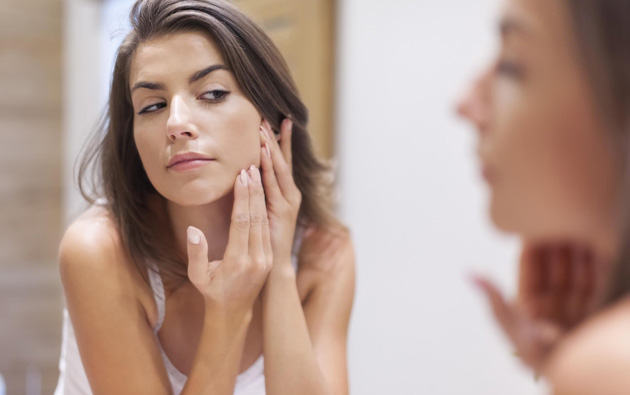
You might have heard all sorts of advice about the outbreak of ACNE on your skin and what you should do about it. The fact is that most of what you thought you knew about acne as a teen and much of what you may think you know about adult acne are probably a myth.
Here are some of the common acne myths you always believed in:
Washing vigorously and using harsh astringents can actually leave your skin traumatized. Washing too many times might not help you, but washing your face twice or thrice a day with lukewarm water and a mild cleanser in gentle circular motion will greatly help you in reducing the acne breakout. Do not forget to wash your face in the evening to remove makeup, dirt and sweat of the day.
Some studies suggested that chocolates containing a large quantity of milk cause acne, however, it is imperative to know that only a large quantity of milk products can trigger acne breakouts. It becomes nearly impossible for someone to gulp down so much quantity of chocolate at once. The root of virtually all acne is genetic, hormonal, and bacterial, but that doesn't mean you can drink all the soda you want and have a clear, glowing complexion. Soda has a few ingredients that may trigger acne breakout in some, but there is no evidence that soda causes skin inflammation.
Some of us squeeze the acne in order to bring down the size of it, however, this usually leads to further inflammation and the problem worsens as it makes the acne look darker and last longer.
You might have heard that eating greasy food will increase the frequency of acne breakout. A number of studies have shown that eating food like French fries, cheeseburgers, potato chips, etc. doesn't have any impact on your skin.
Acne is not contagious at all and cannot infect the other person. Though bacteria is involved in the development of acne, it cannot be transmitted like other bacterial infections, however, it is not recommended to share towels and pillows with someone else for hygiene reasons.
Acne is not just confined to teenagers, but adults too face the same problem often, it is just that their acne is a bit different than teenagers. It’s more likely to be reddish nodules around the mouth and jaw rather than whiteheads or blackheads scattered all over the face of the teenagers.
There is a little evidence that suggests face mapping is effective for acne, however, there are several factors that may trigger acne breakout.
Forehead acne can be caused by certain hair styling products like waxes and oils, which block the pores often. It can also occur if you have a fringe, as the hair will rub against the forehead skin, causing irritation, potentially contributing to acne breakouts.
Cheek acne can result from phone use as the touch screens contain large numbers of bacteria on their surface and placing your phone, against your cheek creates pressure that may activate your oil-producing glands.
Jaw line and around the mouth - Acne affecting the lower half of the face is often linked to hormonal changes, particularly observed in women at a later age. They are usually deep, red, painful cysts under the skin rather than blackheads or whiteheads.
Even an oily skin needs moisturizer as excess oil does not mean that the skin is fully hydrated. Wash your skin twice, once in the morning and then in the evening with a cleanser specially formulated for acne (containing salicylic acid or benzoyl peroxide). After cleansing your skin, use a light gel-based moisturizer that is "non-comedogenic" as this will prevent the formation of blackheads. Finally, use a prescribed retinoid product on the skin before leaving for bed, it will help unclog pores, reduce the formation of blackheads or whiteheads, and calm inflammation.
There are is no proper study or report so far which suggest that stress hormone is a triggering agent in the acne breakout. In a study, some students were observed; some had increased acne breakout during their final exams while some remain unaffected. This myth may have some basis in reality, but it’s hard to quantify.
Thicker liquid foundations can actually clog pores, but lighter, loose powder foundations like mineral powders does not affect your skin, you can easily wear it anytime you want without worrying much about acne.
Try anti-acne gel and anti-acne soap by AcneStar to treat your acne and come out loud because a simple pimple cannot defeat you.
Disclaimer This blog solely intended for the educational/informational/awareness purposes and is not a substitute for any professional medical advice, diagnosis or treatment. Please consult your doctor/healthcare professional before acting on the information provided on the blog. Reliance on any or all information provided in the blog, is solely at your own risk and responsibility. Mankind Pharma Limited shall not be held liable, in any circumstance whatsoever.

Acne is a skin condition that occurs when your hair follicles become plugged with oil and dead skin cells.

it is absolutely imperative to know its type. Acne can be inflammatory or non-inflammatory which further has different lesions, as mentioned below.

Acne starts occurring in teenagers due to an increase in the level of Androgen production. Androgen is a hormone which signals the body to produce more sebum, the oil produced by the sebaceous glands.

Acne is a skin condition that occurs when your hair follicles become plugged with oil and dead skin cells. It often causes whiteheads, blackheads or pimples, and usually appears on the face, forehead, chest, upper back and shoulders. Acne is most common among teenagers, though it affects people of all ages.

Debunk acne myths by following a proper skincare regimen. Taking good care of your skin can help you achieve a glowing and acne-free skin.